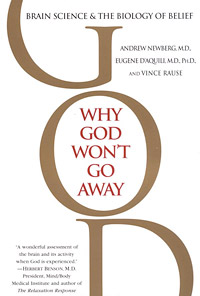A review of Andrew Newberg, Eugene D’Aquili, and Vince Rause’s Why God Won’t Go Away: Brain Science and the Biology of Belief.
About ten years ago I began research on the question of why people believe in God, I asked a colleague in a religious studies program to recommend the latest path-breaking scientific work in this area. (continue reading…)
read or write comments (31)
A review of Matt Ridley’s Genome: the Autobiography of a Species in 23 Chapters.
We are at a unique confluence of science and publishing where the results of the former are being dispersed by the latter at such a rate that even the most ardent reader of popular science books can hardly keep up. This is good news for science, of course, since its products are outstripping even Moore’s law of doubling every eighteen months, so updates and revisions are called for just as frequently. Lucky for publishers that readers are willing and able to plunk down a quarter of a hundred bucks to discover the secrets of the cosmos and life, and literary agents specializing in science tomes are demanding — and getting — five- and six-figure advances for their clients. And by most counts publishers are earning out those advances in a matter of months, thereby closing indefinitely the gap between C.P. Snow’s two cultures. (continue reading…)
read or write comments (1)
A review of three books: Ullica Segerstråle’s Defenders of the Truth, Robin Marantz Henig’s The Monk in the Garden, and Jeffrey K. McKee’s The Riddled Chain.
Creationism, in some form, will probably be with us as long as biblical fundamentalists continue their misguided efforts to squeeze the square peg of religion into the round hole of science. But the debate over whether evolution happened was (continue reading…)
read or write comments (1)
A review of Martha Sherrill’s The Buddha from Brooklyn: A Tale of Spiritual Seduction.
There is a humorous scene in Woody Allen’s Hannah and Her Sisters, when his unfulfilled and neurotically Jewish character fails to find meaning in alternate religious expressions after visiting a Catholic church and returning home with a loaf of white bread, a jar of mayonnaise, and a crucifix. The reason, of course, is that the trappings and facade of a religion will not get you to that deeper place where so many desire to go.
Why do people believe in God? Why have all people throughout history, in all cultures around the world, embraced some sort of spiritual expression or religious impulse? Social scientists have attempted to answer the question scientifically through theories and statistics, but humans are storytelling animals and nothing captures the essence of a belief better than an in-depth story about one group’s religious experiences as they struggle with the messiness of day-to-day living in a secular world. (continue reading…)
Comments Off on Desperately Seeking Spiritualism
A review of Robert Wright’s Nonzero: The Logic of Human Destiny.
Humans are pattern-seeking, storytelling animals. We look for and find patterns in our world and in our lives, then weave narratives around those patterns to bring them to life and give them meaning. Such is the stuff of which myth, religion, history, and science are made.
Sometimes the patterns we find represent reality — DNA as the basis of heredity or the fossil record as the history of life. But sometimes the patters are imposed by our minds rather than discovered by them — the face on Mars (actually an eroded mountain) or the Virgin Mary’s image on the side of a glass building in Clearwater, Florida (really an oil stain from a palm tree, since removed to enable the faithful to better view their icon). The rub lies in distinguishing which patterns are true and which are false, and the essential tension (as Thomas Kuhn called it) pits skepticism against credulity as we try to decide which patterns should be rejected and which should be embraced. (continue reading…)
read or write comments (5)






